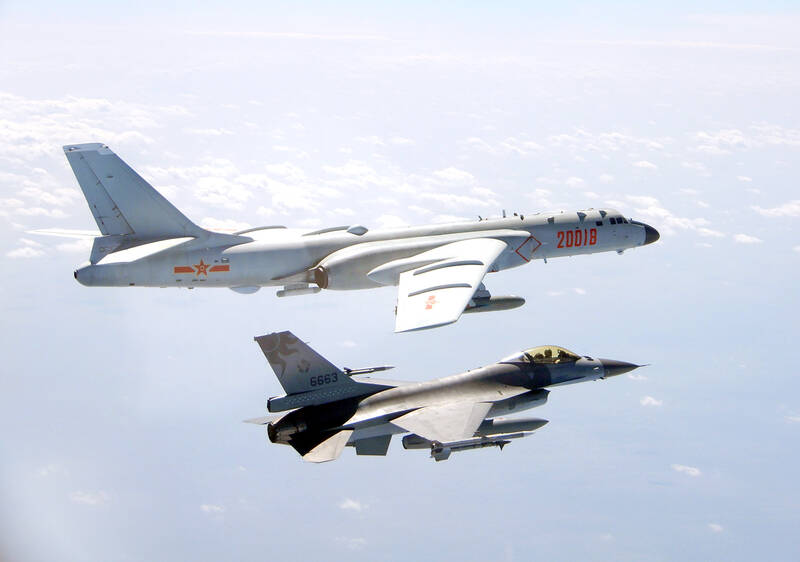China’s latest military exercises represent a new challenge to Taiwan’s legal authority to demarcate its borders in the Taiwan Strait, a defense expert said, adding that the fleets in the latest exercises were likely the most powerful the People’s Liberation Army (PLA) ever assembled.
The PLA conducted military exercises from Sunday last week to 6am on Friday, which encompassed large swathes of the western Pacific, including the Taiwan Strait and waters off the Philippines and Guam, National Policy Foundation associate research fellow Chieh Chung (揭仲) said on Friday.
The Ministry of National Defense said that it detected 70 warship and 162 aircraft sorties over the period in the Strait.

Photo courtesy of the Ministry of National Defense
China’s Northern, Southern, and Eastern Theater commands participated in the exercises, with each command deploying its fleet and a large complement of aircraft to different strategic axes in the Taiwan Strait and waters off the Philippines and Guam, he said.
These actions signified an escalation in China’s “gray zone” warfare against Taiwan and a show of force directed at the nation, Japan and the US simultaneously, Chieh said.
Chieh said that PLA aircraft not only crossed the median line of the Strait on the first day of the exercises, but also deliberately entered prohibited airspace zones designated R8, R9, R11 and R5, which were claimed by Taiwan, he said.
Two four-plane flights of Shenyang J-16 jets loitered in R9 and R11, the nearest of the intruded areas to Taiwan proper, he said.
The intrusions set a new benchmark for China’s “gray zone” tactics and possibly a new pattern that the PLA would attempt to normalize, he said.
Chinese military aircraft entering these areas had the effect of compressing the depth of Taiwanese air defenses and undermining the nation’s legal authority to establish a prohibited airspace, he said.
On Monday, a PLA Navy (PLAN) destroyer-frigate group of eight vessels and a carrier strike group centered on the carrier Shandong with five escort vessels transited the Miyako Strait and Bashi Channel respectively, Chieh said.
After three days, the Chinese navy again transited the Miyako Strait with the 45th Chinese Naval Escort Task Force, a group composed of three warships of the Northern Theater Command and designated for the Gulf of Aden, he said.
The PLAN deployed three major naval groupings that included 17 surface vessels and an unknown number of submarines, he said.
This force possessed the highest concentration of combat power ever amassed in the PLAN’s history and numerically the largest Chinese fleet exercise in the western Pacific since 2014, Chien said.
Information provided by the Japanese government further indicated that the fleets divided into two groups and engaged in a mock battle that started on Wednesday in an area including the Philippine Sea and waters off Guam, he said.
The simulated battle was a demonstration of China’s capabilities to conduct large-scale naval operations centering on a carrier strike group in the western Pacific targeting the US and other nations, Chien said.

An essay competition jointly organized by a local writing society and a publisher affiliated with the Chinese Communist Party (CCP) might have contravened the Act Governing Relations Between the People of the Taiwan Area and the Mainland Area (臺灣地區與大陸地區人民關係條例), the Mainland Affairs Council (MAC) said on Thursday. “In this case, the partner organization is clearly an agency under the CCP’s Fujian Provincial Committee,” MAC Deputy Minister and spokesperson Liang Wen-chieh (梁文傑) said at a news briefing in Taipei. “It also involves bringing Taiwanese students to China with all-expenses-paid arrangements to attend award ceremonies and camps,” Liang said. Those two “characteristics” are typically sufficient

A magnitude 5.9 earthquake that struck about 33km off the coast of Hualien City was the "main shock" in a series of quakes in the area, with aftershocks expected over the next three days, the Central Weather Administration (CWA) said yesterday. Prior to the magnitude 5.9 quake shaking most of Taiwan at 6:53pm yesterday, six other earthquakes stronger than a magnitude of 4, starting with a magnitude 5.5 quake at 6:09pm, occurred in the area. CWA Seismological Center Director Wu Chien-fu (吳健富) confirmed that the quakes were all part of the same series and that the magnitude 5.5 temblor was

The brilliant blue waters, thick foliage and bucolic atmosphere on this seemingly idyllic archipelago deep in the Pacific Ocean belie the key role it now plays in a titanic geopolitical struggle. Palau is again on the front line as China, and the US and its allies prepare their forces in an intensifying contest for control over the Asia-Pacific region. The democratic nation of just 17,000 people hosts US-controlled airstrips and soon-to-be-completed radar installations that the US military describes as “critical” to monitoring vast swathes of water and airspace. It is also a key piece of the second island chain, a string of

The Central Weather Administration has issued a heat alert for southeastern Taiwan, warning of temperatures as high as 36°C today, while alerting some coastal areas of strong winds later in the day. Kaohsiung’s Neimen District (內門) and Pingtung County’s Neipu Township (內埔) are under an orange heat alert, which warns of temperatures as high as 36°C for three consecutive days, the CWA said, citing southwest winds. The heat would also extend to Tainan’s Nansi (楠西) and Yujing (玉井) districts, as well as Pingtung’s Gaoshu (高樹), Yanpu (鹽埔) and Majia (瑪家) townships, it said, forecasting highs of up to 36°C in those areas